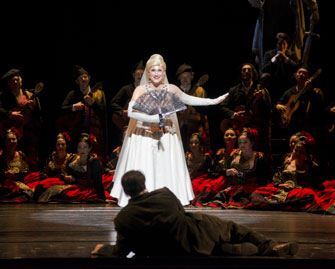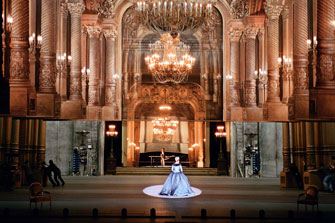Two Self-Regarding Operas
Take the Stage

Jane Archibald (Olympia) and Stefano Secco (Hoffmann). Photo: Opéra national de Paris/Ian Patrick
The two productions opening the Paris opera season, Jacques Offenbach’s The Tales of Hoffmann and Richard Strauss’s Capriccio (at the Bastille and Palais Garnier opera houses, respectively), have more in common with each other than might be expected. Each work was the composer’s final opera and each is concerned with the creative process, Offenbach focusing upon the poet and composer E.T.A. Hoffman and Strauss upon the relationship between words and music as epitomized by two suitors for the Countess’s affections, one a poet and the other a composer.
It also so happens that both productions are directed by the Canadian Robert Carsen (originally staged in 2000 and 2004, respectively).
Carsen offers a visual feast in each opera, and above all successfully exploits the self-regarding nature of both works: each scene of The Tales of Hoffmann, for example, is set in a different part of an opera house: the foyer, auditorium, orchestra pit and stage itself. Although mercifully he does not set Capriccio in an opera house (excessive self-contemplation, after all, can become too much of a good thing), he uses the mechanics of the theater to quite devastating emotional effect at the end.
Offenbach’s previous works belonged to the world of operetta and opera buffa, so one might reasonably expect yet another light and fluffy concoction. However, the composer was determined that this would be the opera to mark him as a serious composer, and on the whole he succeeded admirably. Although he died before finishing it, the opera was more or less complete, with only Act III and the epilogue needing additional work. It begins and ends with a drunken Hoffmann contemplating the prospect of his perfect love, as incarnated by the singer Stella, who is singing Donna Anna in a production of Mozart’s Don Giovanni, which is taking place offstage during the action. The link between the Mozart opera and the stage action is revealing, because in many ways Hoffmann is an anti-Giovanni. While Hoffmann explores his former loves in the three central acts, he is as gullible and trusting as Giovanni is manipulative and conniving. Hoffmann is accompanied by an anti-Leporello figure, Niklausse (a trouser role sung with élan by Kate Aldrich), who tellingly also plays Hoffmann’s Muse in the prologue and epilogue. Whereas Leporello is superstitious and cowardly, Niklausse is rational and wise.
Each of the acts is dominated by a woman, and in this production they all shine: coloratura soprano Jane Archibald (previously seen in Paris as Zerbinetta in Strauss’s Ariadne auf Naxos) as the mechanical doll Olympia, Ana María Martinez as the terminally ill singer Antonia, and Paris Opera stalwart Sophie Koch as the prostitute Giulietta.
The production stands or falls on Hoffmann, who is present almost throughout the opera, and, even though tenor Stefano Secco’s French is rather too Italianate, his singing reaches suitably ardent heights, and he commands the stage. The orchestra, directed by Tomas Netopil, plays with verve throughout.
With two intermissions, the evening has some longueurs, and Offenbach’s music becomes comically pantomime-like every time the devil figure—a different character in each act, played by the same singer, Franck Ferrari—appears. But overall, I was delighted to find that, unlike some other Offenbach works, it most certainly was not all fluff and nonsense.
Capriccio, with its long discussions on the nature of opera, can sometimes seem both arch and self-satisfied, but it is saved by glorious music throughout, not least in the opening

Capriccio. Photo: Opéra national de Paris/E. Mahoudeau
instrumental sextet, the beautiful sonnet scene, the moonlight music toward the end and the Countess’s sumptuous final monologue.
Although this production does not have the all-star cast of the Paris Opera’s production of Strauss’s Arabella from last season, the singers are almost all uniformly good. Only the brittle tone of Michaela Schuster as the actress Clairon disappointed. Michaela Kaune as the Countess was exquisite both vocally and physically, and the two rival lovers, Olivier (sung by Adrian Eröd) and Flamand (Joseph Kaiser) both looked and sounded appropriately passionate and youthful. As always, Philippe Jordan gives energetic and sensitive direction to the Orchestre de l’Opéra National de Paris.
Opéra National de Paris:
The Tales of Hoffmann: Place de la Bastille, 75012 Paris. Métro: Bastille. Tel.: 0 892 89 90 90 or + 33 (0)1 71 25 24 23 (from abroad). Through Oct. 3. Tickets: €5-€180.
Capriccio: Place de la Bastille, 75012 Paris. Métro: Bastille. Tel.: 0 892 89 90 90 or + 33 (0)1 71 25 24 23 (from abroad). Through Sept. 27. Tickets: €10-€180. www.operadeparis.fr
Support Paris Update by ordering music and books from Paris Update’s Amazon store at no extra cost. Click on your preferred Amazon location: U.K., France, U.S.
Reader Reaction: Click here to respond to this article (your response may be published on this page and is subject to editing).
© 2012 Paris Update
Favorite